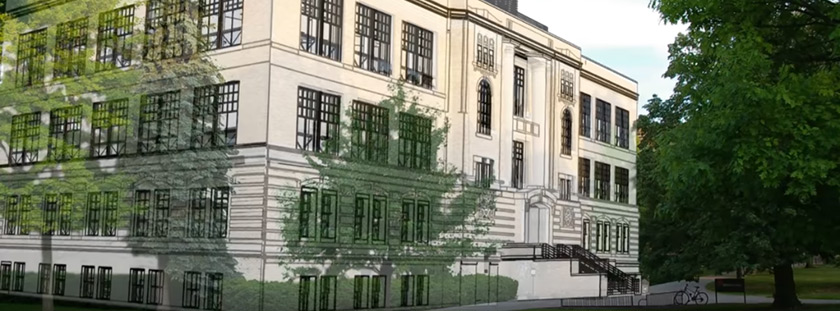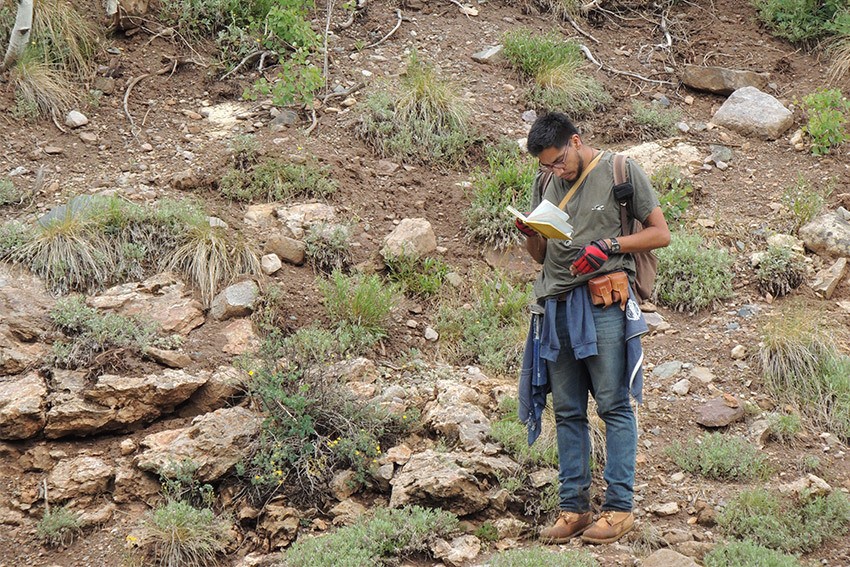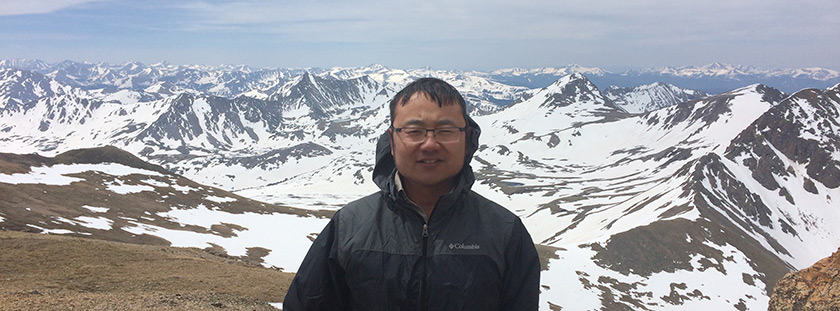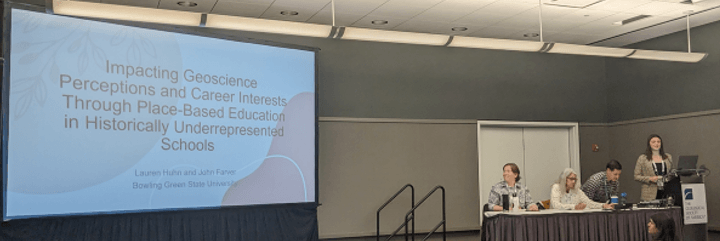Geology Undergraduate Programs
BA/BS Geology
Geologists are employed in environmental industries, oil and gas exploration, metallic and nonmetallic mining, engineering, federal and state geological surveys, and university teaching. Concern for the quality of the environment provides career opportunities for geologists in the areas of water supply, waste disposal and avoidance of geologic hazards. The demand for energy and mineral resources continues to provide jobs in the coal, petroleum and mineral industries in which geologists traditionally have been employed. Careers in geology also provide those who like to travel with a chance to work in a variety of interesting and unusual locations.
Programs in geology emphasize both laboratory and field experience. In addition to a required five-week summer field course held in New Mexico and Colorado, the department periodically offers trips to the Appalachian Mountains; the upper peninsula of Michigan; Mammoth Cave, Kentucky; and the Ohio-Indiana area.
Several degree options are available to students, including a BA and a BS with optional specializations in Hydrogeology and Paleobiology.
Upon completion of the baccalaureate degree, students in geology are expected to:
- Identify, describe and classify earth materials, formations and structures and interpret them in the context of geologic processes.
- Analyze and report quantitative geologic data collected in the field and laboratory.
- Read, write, present and critically evaluate geologic reports, professional papers and maps
- Synthesize information from a variety of disciplines to solve geologic problems
FEATURED

Renovated Moseley Hall Re-opens as Science Complex
When it re-opens after a major renovation in Fall 2017, Moseley Hall will contain laboratory classrooms for the departments of Geology, Chemistry, Biology and Medical Lab Science.
News and Stories

Carlos Martinez ready to dig into career of fossils and rocks
Carlos Martinez found a way to take his childhood interest in dinosaurs and turn it into a career.
The Guadalajara, Mexico, native who emigrated to and grew up in San Jose, California, always wanted to work with dinosaurs — just like a lot of kids — except that interest never left him.
When it came time to look for a college and a major, Martinez knew that he wanted to pursue a paleontology-related discipline. He didn’t know exactly where his education would lead him, but he hoped he would still be involved in the world of dinosaurs, fossils and rocks. Read more...

Earthquake Research Featured in “Science” Journal
An article on micro-earthquakes in California that was co-authored by BGSU assistant professor Yuning Fu was published in the June 16 issue of the journal “Science.” The authors "used 9 years of global positioning system (GPS) vertical deformation time series to constrain models of monthly hydrospheric loading and the resulting stress changes on fault planes of small earthquakes. The seasonal loading analysis reveals earthquakes occurring more frequently during stress conditions that favor earthquake rupture.” It is an honor to be published in this prestigious journal, and these findings are exciting news for the geophysics community.

Lauren Huhn Wins Geoscience Education Research Award
The GSA Geoscience Education Division selected Lauren Huhn, BGSU geology MS student, as the 2023 recipient of the Iris Moreno Totten Geoscience Education Research Award
Her talk titled “Impacting Geoscience Perceptions and Career Interests through Place-Based Education in Historically Underrepresented Schools” was viewed by the award committee as exceptional quality research. that is helping to move the field of geoscience education forward.
Learning Outcomes
Upon completion of the baccalaureate degree, students in Geology are expected to be able to:
- Identify, describe, and classify earth materials, formations, and structures and interpret them in the context of geologic processes;
- Analyze and report quantitative geologic data collected in the field and laboratory;
- Read, write, present, and critically evaluate geologic reports, professional papers and maps;
- Synthesize information from a variety of disciplines to solve geologic problems.
Accreditation and/or Program/Cluster Review
Bowling Green State University [BGSU] is accredited by the Higher Learning Commission. BGSU has been accredited by the Higher Learning Commission since 01/01/1916. The most recent reaffirmation of accreditation was received in 2012 - 2013. Questions should be directed to the Office of Institutional Effectiveness.
The Geology program will undergo Program/Cluster Review during the Academic Year 2019-20.
Professional Licensure (If applicable)
Bowling Green State University programs leading to licensure, certification and/or endorsement, whether delivered online, face-to-face or in a blended format, satisfy the academic requirements for those credentials set forth by the State of Ohio.
Requirements for licensure, certification and/or endorsement eligibility vary greatly from one profession to another and from state to state. The Geology program does not lead to professional licensure.
Gainful Employment (If applicable)
Under the Higher Education Act Title IV disclosure requirements, an institution must provide current and prospective students with information about each of its programs that prepares students for gainful employment in a recognized occupation.
The Geology program is not a recognized occupation that requires a Gainful Employment disclosure.
Updated: 07/03/2024 03:35PM
